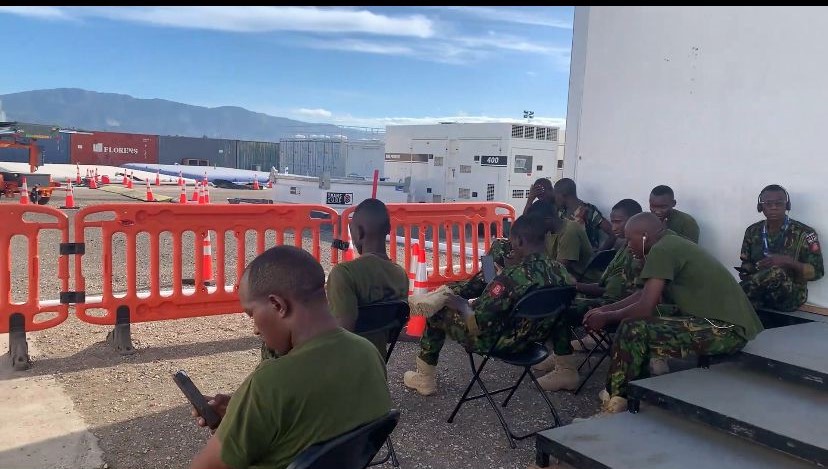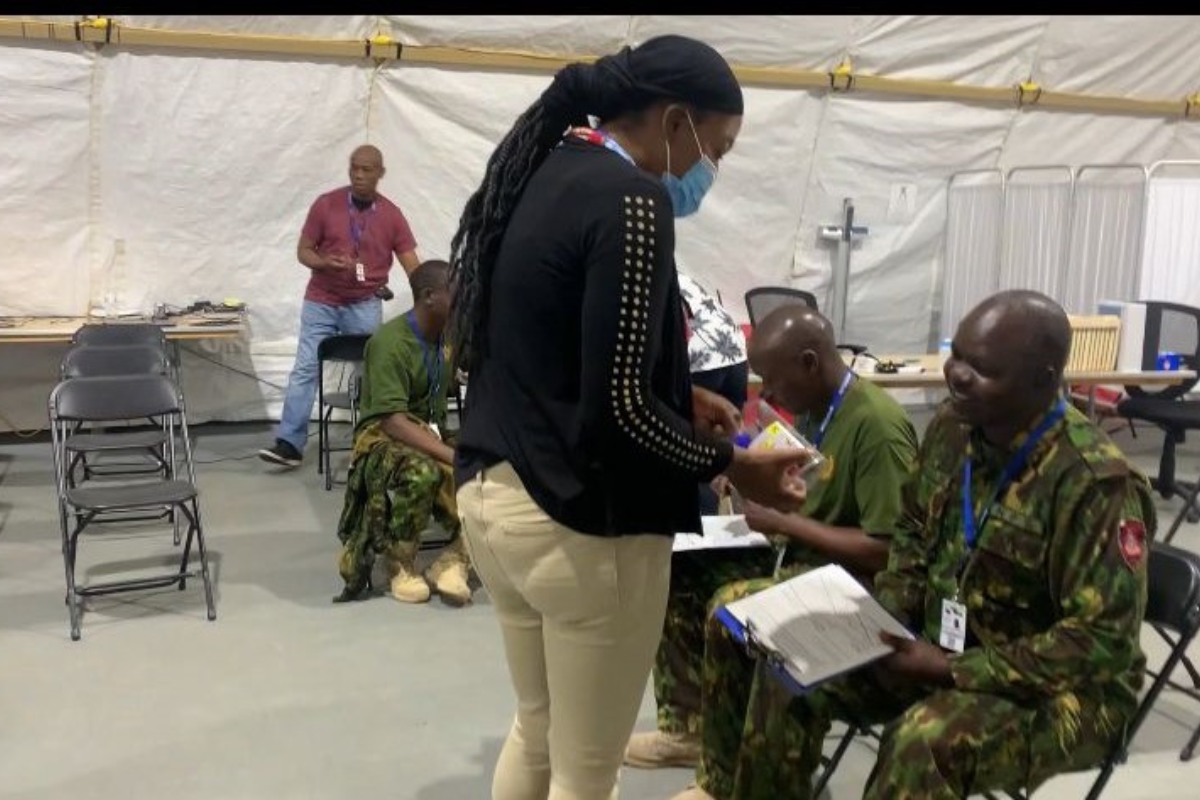Mission officials seem to want to avoid the scandals that occurred during the previous UN mission
The 400 Kenyan officers already in Haiti are forbidden from speaking to the press, consuming alcohol, purchasing food outside the base, or leaving the base for personal reasons, an official source close to the Multinational Security Support Mission (MMAS) told AyiboPost.
Any individual contact with outsiders is strictly prohibited. Nor does the police receive friendly visits.
The use of mobile phones is not forbidden.
But for security and confidentiality reasons, police officers are not allowed to publish photos or videos of themselves on assignment on social networks, except for those that have been officially released by the communication office, continues the source interviewed by AyiboPost.

Kenyan police officers enjoy their free time at their base in Clercine.
More than a month after the landing of the first contingent of Kenyans in Haiti, insecurity continues to plague Port-au-Prince and several provincial towns.
The government has decreed a state of emergency in 14 communes in the West and the Artibonite departments.
An attack carried out by the bandits of Canaan on the communes of Arcahaie and Cabaret, led by Jeff Gwo Lwa, on the afternoon of August 6 left a dozen dead.
In its partial report, presented 15 days following this proclamation, the Haitian police (PNH) announced that they had killed 104 bandits, and seized 19 weapons and 9 vehicles during operations carried out in the West and the Artibonite.
During this same period, the 400 Mawozo gang attacked the commune of Ganthier.
On July 21, the gang’s assaults on this town of 60,000 inhabitants forced nearly 6,000 people to flee their homes.
More than a month after the landing of the first contingent of Kenyans in Haiti, insecurity continues to plague Port-au-Prince and several provincial towns.
Other attacks took place in Gressier and in the Artibonite.
On July 30, Haitian and Kenyan police forces announced that they had carried out an operation in the commune of Ganthier to repel the bandits.
A day later, the gangs returned. On August 4, they set fire to a PNH armored vehicle, after having destroyed the municipal police station a week before.
On the same day, a boat departing from Port-au-Prince, carrying passengers from the National Port Authority in Miragoâne, was attacked by armed men.
Two people were injured.
The last armed international intervention in Haiti was conducted by the United Nations between 2004 and 2017. UN soldiers temporarily pacified the country, but introduced cholera, killing more than 10,000 citizens. They have also been implicated in dozens of cases of human rights violations and sexual violence.
Read also: A look back at 15 years of UN failures in Haiti
The Kenyan force seems to want to learn from this intervention.
An internal regulation provides for sanctions for offenders such as suspension, isolation, and a possible permanent repatriation to Kenya.
Police officers participate in regular intensive training sessions and joint training with the Haitian National Police at the police academy.
Kenyan police officers are « fully invested » in this first phase of the mission, known as the pre-deployment phase, which will last until September 2024, according to the official source.
An internal regulation provides for sanctions for offenders such as suspension, isolation, and a possible permanent repatriation to Kenya.
To date, 400 Kenyan police officers are working in their base in Clercine under the command of Godfrey Otunge.
New troops are expected in Port-au-Prince amid complaints from Haitian and Kenyan authorities regarding the lack of supplies for these reinforcements.
Preparations to welcome the new troops are progressing, according to the source.
Jamaica and El Salvador are among the countries that have already visited Haiti as a precursor to the deployment of their police officers to the country.
Read also: The comprehensive agreement signed with Kenya for the multinational force
The working days are planned one day in advance.
In the camp, the troops were divided into sections. Each section is led by a commander.
The section commander is responsible for planning the days of their platoon.
Haitian Creole and French courses, human rights and first aid training are carried out by Haitian and American professionals for the police officers.

Kenyan officers undergo medical examinations to ensure they are fit to carry out their missions. A hospital has been set up for emergencies and common health problems.
Outside the hangars, driving lessons take place.
In Kenya, as in several East African countries, the steering wheel in cars is placed on the right, and driving is therefore on the left side of the road, unlike in Haiti where it is placed on the left. « This requires adaptation, » the source continues.
The cuisine inside the camp is exclusively Haitian: rice and vegetables, natural juice, griyo, plantain…
No Kenyan culinary specialties are present on the menu, according to the source.
Religious life is a valued component within the camp.
Some police officers brought their Bibles to Haiti.
The Anglican reverend, Constable Emmanuel Magut, one of the policemen, provides services every Sunday.
Sometimes, religious leaders from Port-au-Prince come to organize prayer and preaching services within the base on Saturdays and Sundays.
Watch an excerpt of a Sunday shift at the Kenyan police base in Clercine
The police take advantage of their free time to listen to Haitian troubadour music, Benga or Kapuka, talk with their families back in Kenya, or to work out.
Benga and Kapuka are Kenyan musical genres that blend elements of traditional music with contemporary influences.
On July 30, 2024, a Kenyan police officer was injured during a clash between a Kenyan patrol and armed individuals in downtown Port-au-Prince.
« He is doing better and better. He will be able to start training again, » the source told AyiboPost.
Cover image: Kenyan police officers stationed near the U.S. Embassy in Tabarre, July 5, 2024. | © Jean Feguens Regala/AyiboPost
Keep in touch with AyiboPost via:
► Our channelTelegram:click here
► Our ChannelWhatsApp:click here
► Our CommunityWhatsApp:click here







Comments